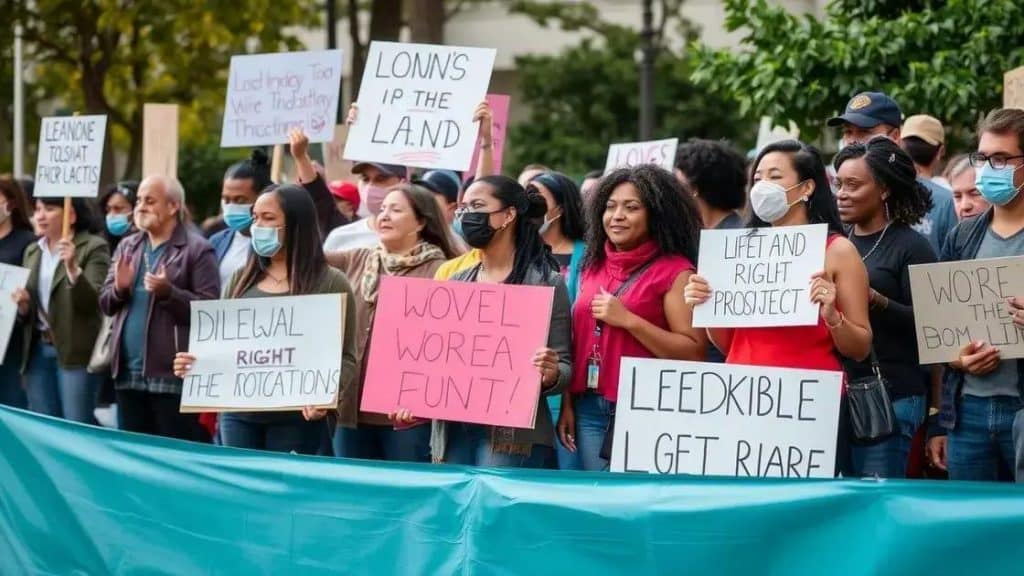Politics legal rights protection: what you need to know

Politics legal rights protection involves advocating for and ensuring the enforcement of legal rights, facing challenges such as political resistance and systemic inequality, while leveraging technology and global collaboration to promote equity and justice.
Politics legal rights protection plays a crucial role in ensuring fairness and justice in society. Have you ever wondered how your rights are safeguarded? Let’s explore this essential topic together.
Understanding legal rights in politics
Understanding legal rights in politics is vital to any democratic society. These rights ensure that every individual is treated fairly and equally under the law. Without them, important freedoms can easily be undermined.
What are legal rights?
Legal rights are the protections granted to individuals by the law. They cover various areas, including freedom of speech, right to vote, and the right to fair trial. Each of these rights plays a fundamental role in maintaining a just political system.
Examples of legal rights in politics
- Freedom of speech: This allows citizens to express their opinions without fear of government retaliation.
- Right to assemble: Citizens can gather peacefully to express their views on political issues.
- Right to vote: This ensures that citizens have a say in their government.
- Due process: Everyone is entitled to a fair legal process before any judgment is made.
These examples highlight how legal rights shape our political environment. They empower citizens and create a platform for dialogue and change. When these rights are respected, it strengthens democracy and promotes active participation among citizens.
Moreover, understanding the scope of these rights can help individuals recognize when their rights are under threat. Advocacy groups play a crucial role in raising awareness and defending legal rights. They work tirelessly to protect individuals facing injustice and to promote equality.
The importance of awareness
Being informed about your legal rights in politics helps ensure they are upheld. Educated citizens are more likely to stand up against abuse of power and advocate for changes. It’s essential to not only understand your own rights but also to recognize and respect the rights of others.
As we reflect on the significance of legal rights, it becomes clear that protecting these rights is not just a personal obligation but a collective responsibility. Each individual must contribute to fostering a fair society where everyone’s rights are respected.
The role of advocacy in rights protection
The role of advocacy in rights protection is crucial for maintaining and promoting individual freedoms. Advocacy involves activities that aim to influence decisions made by government officials and other institutions. It ensures that everyone’s rights are defended.
What is advocacy?
Advocacy is a process that involves speaking up for others, raising awareness, and pushing for policy changes. Advocates often work on behalf of individuals or groups whose rights are at risk. Their efforts can lead to significant changes in laws and practices that affect legal rights.
Key functions of advocacy
- Raising awareness: Advocates inform the public about important issues related to legal rights. This helps mobilize community support.
- Engaging with policymakers: They frequently communicate with lawmakers to promote changes that protect rights.
- Providing support: Advocacy groups offer resources and assistance to those in need, ensuring that people know their rights.
- Monitoring compliance: Advocates keep track of how effectively laws are being implemented and highlight any failures.
By understanding the significance of advocacy, individuals are better equipped to participate in movements that demand change. Moreover, advocacy can empower communities, offering them a voice in political matters. For many, knowing that they have advocates fighting for their legal rights provides hope and motivation.
Effective advocacy requires collaboration. Different organizations and individuals come together to form coalitions, combining their efforts for a stronger impact. These coalitions often address multiple issues, maximizing their influence in the political arena.
Examples of successful advocacy
Many historical movements demonstrate the impact of advocacy. For instance, civil rights movements have transformed laws related to racial equality, while women’s rights groups have fought for gender equality. These examples show how focused advocacy can lead to tangible changes in society.
Ultimately, recognizing the role of advocacy in protecting legal rights can inspire citizens to get involved. Active participation in advocacy efforts helps shape a fairer society and ensures that everyone’s rights are respected.
Case studies of successful rights initiatives

Case studies of successful rights initiatives provide valuable lessons and inspiration for future advocacy. These initiatives show how dedicated individuals and groups can bring meaningful change to society. Understanding such examples helps others strategize their own efforts in defending
legal rights.
The civil rights movement
One of the most famous examples is the civil rights movement in the United States during the 1950s and 1960s. This initiative aimed to end racial discrimination and secure equal rights for African Americans. Leaders like Martin Luther King Jr. utilized nonviolent protests and legal challenges to fight for justice.
Key achievements of the movement
- Voting Rights Act of 1965: This landmark legislation prohibited racial discrimination in voting, empowering millions.
- Civil Rights Act of 1964: It outlawed discrimination based on race, color, religion, sex, or national origin.
- Segregation elimination: The movement helped dismantle legalized segregation in public spaces.
These achievements showed that dedicated advocacy can lead to significant improvements in society, inspiring future movements worldwide.
Women’s rights initiatives
Another impactful example is the women’s rights movement, which has fought for gender equality for decades. This initiative gained momentum in the late 19th century and continues to evolve today. Key events, such as the Seneca Falls Convention in 1848, laid the groundwork for women’s suffrage.
Advocacy played a central role in securing voting rights for women, culminating in the 19th Amendment to the U.S. Constitution in 1920. This achievement represents how focused efforts can dismantle barriers that deny rights based on gender.
Modern initiatives
More recent case studies involve movements for LGBTQ+ rights. For example, the legalization of same-sex marriage in many countries marks a historic shift in societal attitudes. Groups like the Human Rights Campaign have tirelessly worked to promote legal rights for LGBTQ+ individuals, pushing for acceptance and equality.
These initiatives generally involve public awareness campaigns, legal actions, and community support. Success stories, such as the Supreme Court ruling in favor of same-sex marriage in the U.S. in 2015, demonstrate the power of advocacy.
By examining these case studies, activists can learn strategies that have proven successful in the past. These lessons are essential for shaping future movements aimed at protecting and promoting legal rights across various communities.
Challenges in legal rights protection
Challenges in legal rights protection present significant barriers to ensuring justice and equality for all individuals. Despite numerous efforts by advocates and organizations, various obstacles continue to impede progress in protecting these rights.
Political resistance
One major challenge is the political resistance that often arises when changes are proposed. Some lawmakers may oppose new laws aimed at enhancing legal rights, fearing backlash from constituents or powerful interest groups. This can stall critical reforms, leaving citizens vulnerable.
Systemic inequality
Another challenge is systemic inequality, where certain groups face multiple disadvantages, such as race, gender, or socio-economic status. These inequalities can create a cycle of disadvantage that is hard to break. Sometimes, laws exist, but they are not enforced effectively, leaving many without the protections they need. This situation highlights how advocacy efforts must also address underlying social issues.
Lack of awareness
- Lack of public knowledge: Many people are unaware of their rights, making it difficult for them to advocate for themselves.
- Insufficient funding: Advocacy groups often struggle to secure funding, limiting their outreach and ability to provide resources.
- Language barriers: Non-native speakers may not understand legal documents or processes, which can hinder their access to justice.
- Fear of retaliation: Individuals may hesitate to speak out against injustices due to fear of consequences.
These factors contribute to an environment where many do not receive adequate protection for their legal rights. Recognizing these challenges can motivate individuals to engage in advocacy and support efforts that aim to dismantle these barriers.
Furthermore, societal apathy often plays a role. When awareness and concern for the plight of marginalized communities are low, there is less pressure on lawmakers to prioritize change. Encouraging active participation in civic duties can help combat this issue by fostering a culture where everyone feels empowered to demand their rights.
In summary, navigating the challenges in legal rights protection is essential for creating a fairer society. It requires the collective effort of individuals, organizations, and governments to overcome these obstacles and ensure that legal rights are both recognized and respected.
Future trends in politics and rights advocacy
Future trends in politics and rights advocacy are shaping a new landscape for how we understand and protect legal rights. As society progresses, various factors such as technology, global collaboration, and changing social attitudes play crucial roles in this evolution.
The impact of technology
Technology is transforming the way advocacy takes place. Social media platforms allow advocates to reach larger audiences than ever before. They can quickly share information, mobilize support, and highlight issues at a moment’s notice. This increased connectivity enables grassroots movements to gain momentum more swiftly.
Data-driven advocacy
- Using analytics: Advocacy organizations are utilizing data analytics to track public sentiment and measure the effectiveness of their campaigns.
- Enhanced research: Better data collection methods help in understanding the needs of affected communities.
- Targeted messaging: Data allows for personalized outreach efforts, improving engagement with specific demographics.
- Transparency: Technology enhances transparency in advocacy, as more data becomes publicly available for analysis.
This data-driven approach empowers advocates to make informed decisions and tailor their strategies for better outcomes. While technology presents new opportunities, it also poses challenges such as digital privacy concerns and the spread of misinformation.
Global collaboration
Another trend is the rise of global collaboration among advocacy groups. Issues like climate change, human rights, and social justice transcend borders. Organizations are forming alliances that cross geographical lines, sharing resources, knowledge, and strategies. This collaboration strengthens movements and amplifies their impact.
Moreover, international agreements and treaties are becoming increasingly important in shaping national policies. Countries are more likely to follow through on commitments made at global forums, pushing for progress on legal rights.
Shifts in social attitudes
Social attitudes towards rights and justice are also evolving. Younger generations prioritize inclusivity and equality more than ever. This change is driving political conversations and inspiring new legislation aimed at expanding legal rights for marginalized communities. As social norms shift, political leaders are pressured to respond to these changes.
The increasing call for justice often demands that lawmakers address long-standing inequalities. This societal shift is evident in movements advocating for racial and gender equality, LGBTQ+ rights, and environmental protections. Engaging with these evolving attitudes is essential for effective advocacy in the future.
In summary, understanding these future trends in politics and rights advocacy can help advocates prepare for the challenges and opportunities that lie ahead. Technology, global collaboration, and shifting social norms will undoubtedly reshape the landscape of legal rights protection.
FAQ – Frequently Asked Questions about Politics and Rights Advocacy
What is the role of technology in rights advocacy?
Technology enhances advocacy efforts by allowing activists to reach larger audiences through social media and data analytics, making campaigns more effective.
How can citizens contribute to rights advocacy?
Citizens can participate by raising awareness of issues, supporting advocacy groups, and actively engaging in community discussions about legal rights.
What are some challenges faced in legal rights protection?
Challenges include political resistance, systemic inequality, lack of awareness, and insufficient funding for advocacy efforts.
Why is global collaboration important for rights advocacy?
Global collaboration allows advocacy groups to share resources, strategies, and knowledge, which enhances the impact on international human rights issues.





